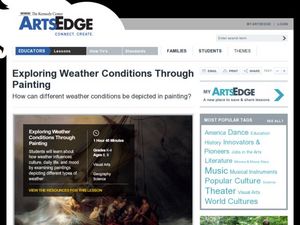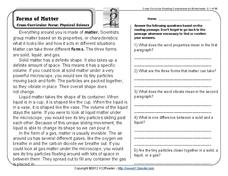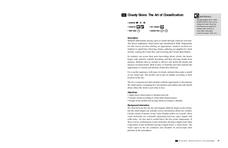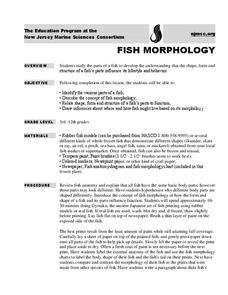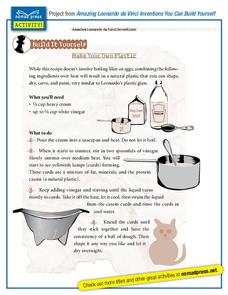Curated OER
Crazy for Cubes: Art and Science
Learners discuss Sol LeWitt and conceptual art, then analyze the differences in expressing a concept through model-based inquiry and aesthetic art criticism. They develop a geometric, scientific, or mathematical concept, then create an...
Curated OER
Exploring Weather Conditions Through Painting
Your advanced class will paint a picture of a particular weather condition. In this painting lesson young scholars describe elements of art in pieces of artwork. They analyze the weather and seasons in the artwork. The students use...
Curated OER
Get Crafty! Integrate Art and Science
By combining diverse subjects, you will create some of your most memorable lessons.
Curated OER
Soft Sculpture Birds
Art can mimic life, and animals are always interesting subjects. Learners create large soft sculptures (stuffed) birds using paper, paint, and other basic collage materials. They view images of birds, and discuss bird traits and shapes....
California Academy of Science
Fish Forms
I've said it before, and I'll say it again, you can add art to any lesson! While little learners are discovering why fish have specific body parts such as, scales, fins, and gills, they start making three-dimensional fish forms. Children...
Curated OER
Harvesting Mosaics
Students use pieces of farm pictures to investigate the elements of art. In this farm art lesson, students use pieces of pictures to create an original artwork. Students use the Internet to find images. Students create a...
K12 Reader
Forms of Matter
In this forms of matter worksheet, students read a 4 paragraph article about forms of matter, then complete a set of 5 short answer comprehension questions.
Dick Blick Art Materials
Insoluble Paintings
Insolubility and density? Yup, it's art class, of course. To create insoluble paintings that continually move and change, kids mix water-based paint with mineral oil and seal the mixture in laminating pouches.
Curated OER
Kirigami: The Ancient Art of Paper Cutting
Young scholars perform inquiry into the ancient art of Kirigami. The research provides a context for the instructional activity and how it is related to History. Students also appreciate the art for the sake of its contribution to culture.
Curated OER
Start at the Very Beginning
Students explore ocean ecosystems. In this cross curriculum art and oceans lesson plan, students create a collage featuring three-finger algae using sand paper, tissue paper, and construction paper.
John Lentine
Butterflies and Bugs
Symmetry, line, shape, art, and math are all connected through a fun hands-on craft. Included are instructions to a classic activity, where learners create butterflies to show symmetry in nature and then discuss symmetry in math. It is...
Curated OER
Sponge Painting Flowers
Explore the shapes and colors of spring with a flower themed painting project. Included here are a list of materials and the instructions needed to execute an art lesson on sponge painting flowers. Tip: Use in conjunction with a flower...
Curated OER
Starfish Project: Ceramics
After exploring the wonders of ocean life found in tidal pools, explore ocean life through ceramic art. Kids use texturing and the pinch-and-pull technique to create starfish, just like the ones found at the seashore. Suggested...
MENSA Education & Research Foundation
Hurricanes
Learn the ins and outs of hurricanes through a series of lessons answering, "What is a hurricane? How does it travel? How is one formed, measured, and named?" Information is presented through informative text and images, while...
Bekshire Museum
Cloudy Skies: The Art of Classification
Such a great resource and perfect for learners in Kindergarten through third grade. The class will discuss cloud types and formation, and then they'll get outside and draw as they observe the clouds they see. They'll need to take note of...
Curated OER
Model Construction
In this lesson, learners explore shapes and forms in architecture. Students understand that the function of architecture influences its form as well as construst a simple architectural model. As an assessment, have learners with a...
Consortium for Ocean Science Exploration and Engagement (COSEE)
Fish Morphology
Life comes in all different shapes and sizes, and fish are no exception. Here, young scientists create fish prints as they learn how specific characteristics allow different species to survive in their particular habitats.
Curated OER
ABC and 1-2-3 Farming
Students demonstrate how to alphabetize animal names. In this word study lesson, students identify animals that live on the farm and conduct a favorite farm animal survey. Students order animal pictures in alphabetical order.
Curated OER
The Giant Barrel Sponge
Learners study barrel sponges. In this science and art lesson, students discuss what sponges are, create their own sponge, and share what they created with the rest of the class.
Nomad Press
Amazing Leonardo da Vinci Inventions: Make Your Own Plastic
When you hear Leonardo da Vinci mentioned, chances are that you think of the Mona Lisa, or flying machines—but what about plastic? Learners blend heavy cream and vinegar over heat to replicate da Vinci's early organic plastic recipe.
Curated OER
Wired with Alexander Calder
Kids consider how the body functions and moves, how each structure has a specific movement and purpose. They apply that idea as they construct a sculptural piece that moves. For inspiration they look to the work of Alexander Calder,...
Hawaiʻi State Department of Education
Cloud Sculpting
Dance is a fantastic way to communicate thoughts, feelings, and even science concepts. Make this activity a part of your next unit on weather and clouds. Kids will discuss types of clouds, how they look, and what they do. Then, they will...
Curated OER
Weather Dance
Students study weather and focus on specific dance concepts. They are introduced to different ty es of clouds and how they are formed. Next, they study wind and why it occurs.
Curated OER
Adopt An Insect
This lesson plan combines a creative building activity with analyzing a butterfly photograph and using problem solving to complete the puzzle. It blends art and science very well. Students will learn and enjoy the process. The extension...

